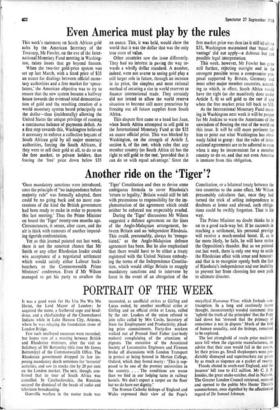Even America must play by the rules
This week's statement on South African gold sales by the American Secretary of the Treasury, Mr Fowler, on the eve of the Inter- national Monetary Fund meeting in Washing- ton, raises issues that go beyond finance.
When the two-tier gold-price system was set up last March, with a fixed price of $35 an ounce for dealings between official mone- tary authorities and a free market for 'specu- lators,' the American objective was to try to ensure that the new system became a halfway house towards the eventual total demonetisa- tion of gold and the resulting creation of a world monetary system based principally on the dollar—thus (incidentally) allowing the United States the unique privilege of running a continuous balance of payments deficit. As a first step towards this, Washington believed it necessary to enforce a collective boycott of South African gold by all major monetary authorities, forcing the South Africans, if they were to sell their gold at all, to do so on the free market, to private holders, thus forcing the 'free' price down below $35 an ounce. This, it was held, would show the world that it was the dollar that was the only true store of value.
Other countries saw the issue differently. They had no interest in paving the way to- wards a wholly dollar standard. A number, indeed, were not averse to seeing gold play a still larger role in future, through an increase in its price, the simplest and most rational method of securing a rise in world reserves to finance international trade. They certainly did not intend to allow the world reserve situation to become still more precarious by freezing out all future supplies from South Africa.
This dispute first came to a head last June, when South Africa attempted to sell gold to the International Monetary Fund at the $35 an ounce official price. This was blocked by Washington, on the strength of Article 5, section 6, of the IMF, which rules that any member country (as South Africa is) has the right to sell gold to the IMF, 'provided that it can do so with equal advantage.' Since the free market price was then (as it still is) above $35, Washington maintained that 'equal ad- vantage' did not apply—a dubious but just possible legal interpretation.
This week, however, Mr Fowler has gone still further, rejecting outright and in the strongest possible terms a compromise pro- posal supported by Britain, Germany and most other major member countries, accord. ing to which, in effect, South Africa would have the right (as she manifestly does under Article 5, 6) to sell gold to the IMF if and when the free market price fell back to $35.
At the International Monetary Fund meet- ing in Washington next week it will be proper for Mr Jenkins to warn the Americans of the unwisdom of flouting the rest of the world on this issue. It will be still more pertinent for him to point out what Washington has obvi- ously failed to grasp: that the rules of inter- national agreements are to be adhered to even when it may be inconvenient for a member country to do so, and that not even America is immune from this obligation.










































 Previous page
Previous page